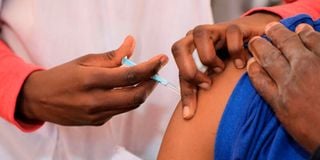Premium
Bolstering healthcare beyond the pandemic

A nurse administers Covid-19 vaccine to a member of the public at Kencom Bus terminal on December 23, 2021.
What you need to know:
- The pandemic has affected us all, collectively and personally, albeit in unequal measure.
- Much has been written about why Africa appears to have been spared the worst effects that many had predicted.
It has now been two years since Africa identified its first case of Covid-19. The pandemic has affected us all, collectively and personally, albeit in unequal measure. The situation is still unfolding but as we look back on our collective experiences, what have we learnt so far?
The received wisdom in many corners used to be that infectious diseases – like HIV and Ebola - originate from the poorer parts of the world. The novel Coronavirus has disproved that theory. The global response to this virus also laid bare weaknesses in the effectiveness of current multilateral frameworks in the face of a global crisis.
Drawing from their previous experience of dealing with epidemics in the region, political leaders in East Africa rose well to the challenge. Uganda, for example, implemented lockdown even before the first case of Coronavirus was detected. Across East Africa, political leaders were sensitive to the need to avoid fragile healthcare systems being overrun by the virus. Those early actions helped to contain the expansion of COVID-19 in the region.
Much has been written about why Africa appears to have been spared the worst effects that many had predicted. It is perhaps too early to speculate. Nevertheless, there are strong grounds for pushing the case for strong community-based primary health care systems that promote wellness and healthy lifestyles, instead of the singular focus on treating diseases.
The Aga Khan Development Network’s approach to healthcare and education in the region recognises the importance of this through its focus on what are called the ‘social determinants of health’, including education and improving quality of life. For example, the network has long prioritised women’s access to quality maternal health care, adequate nutrition and the empowerment of boys and girls equally through quality education.
Disrupted supply chains
This week, a new crop of graduands across East Africa will enhance their professional credentials with degrees and diplomas from the Aga Khan University’s Medical College and the School of Nursing and Midwifery.
Since inception, these programmes have seen more than 300 medical specialists and sub-specialists, and more than 3,000 qualified nurses and midwives join the ranks of the medical profession in Kenya, Uganda and Tanzania. Guided by the principles of impact, quality, relevance and access, the Aga Khan University and Aga Khan Health Services continue to invest heavily in building health professionals capacity in East Africa.
Another important observation from the past two years concerns the risks of reliance on imported commodities, pharmaceutical products and equipment. Disrupted supply chains meant that many African countries were denied early access to personal protective equipment, oxygen, ventilators, testing equipment, medications and vaccines.
This is why the Aga Khan Fund for Economic Development is continuing to invest in diversified manufacturing capacity for pharmaceutical and medical products in the East African region.
But more is needed, and we must continue to make the case for development partners to support African efforts to build regional value chains and attract manufacturing.
New healthcare landscape
As we look to the future, it will be important to consider how Africa’s young population can help drive technological advancement and innovation. Today, the power of technology allows us to capture data that can help track the spread of a virus in granular detail.
Advanced IT systems provide data on health systems capacity in real time across large areas. We have the opportunity to exploit this technology. What is needed is an enabling environment that can spur innovation. And, of course, in the end this requires building trust in our governance and policy makers.
The pandemic has shown us that our region is resilient. The cost has been high – and it has been borne unequally across different sections of society, generations and geographies. But we have grounds to be optimistic about the future.
Regional collaboration, certainly across East Africa but also across the African continent, and institutions like the new African Medicines Agency, open up powerful possibilities. The time is now upon us to envision a new landscape for health and healthcare in our region.
Amin Mawji OBE is the Diplomatic Representative of the Aga Khan Development Network based in Kampala.





